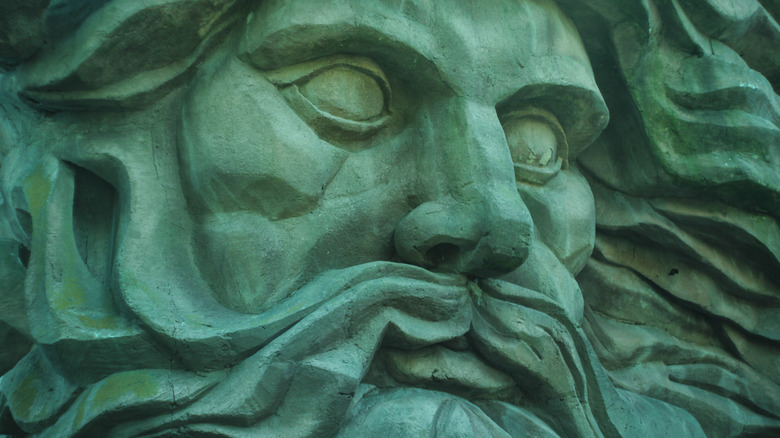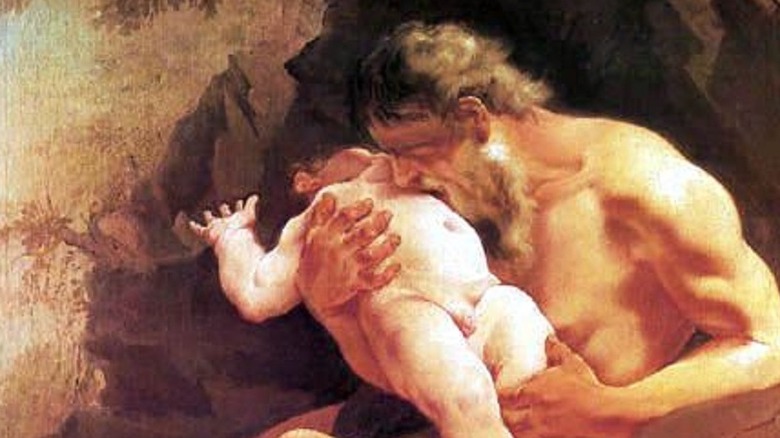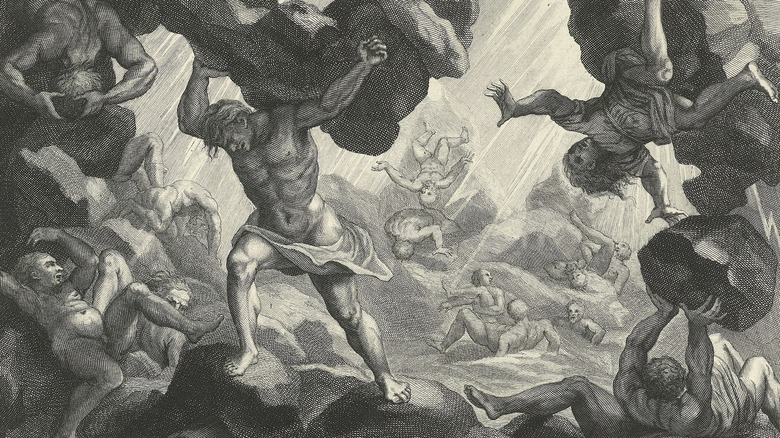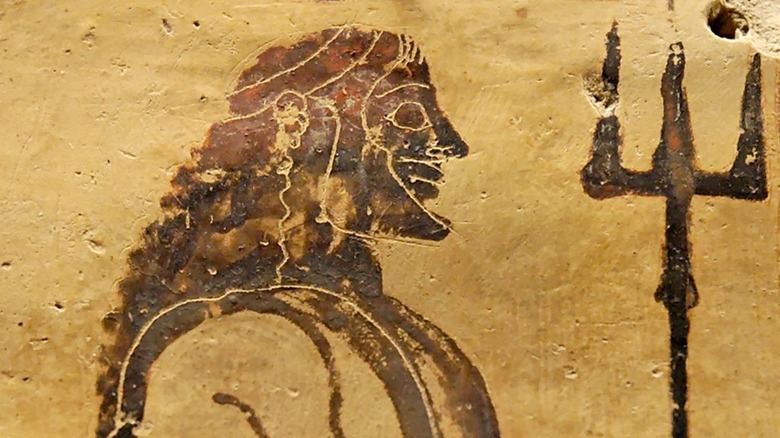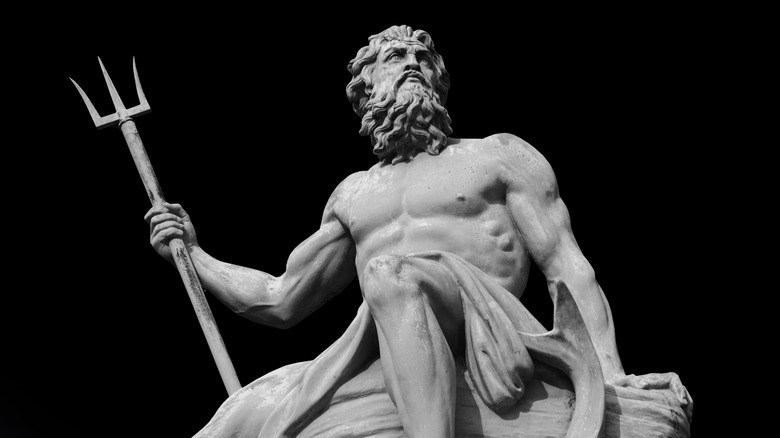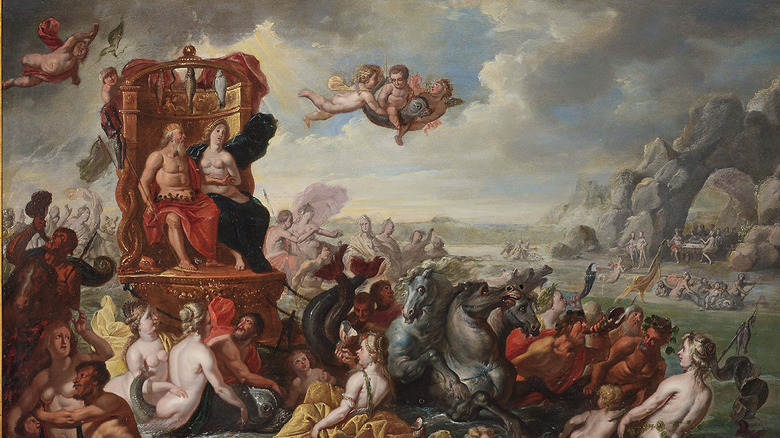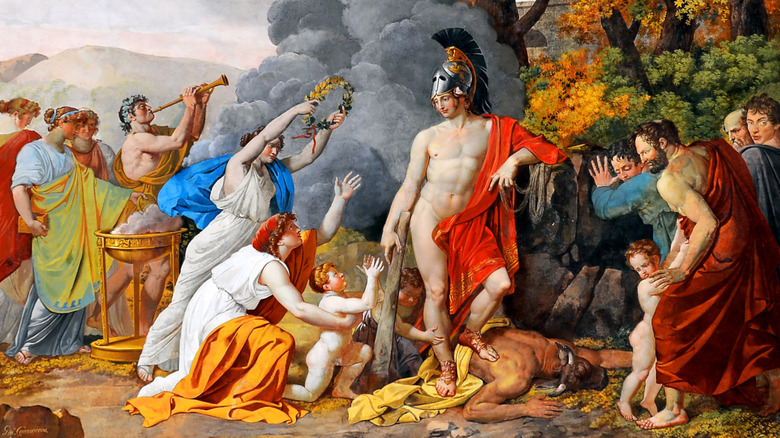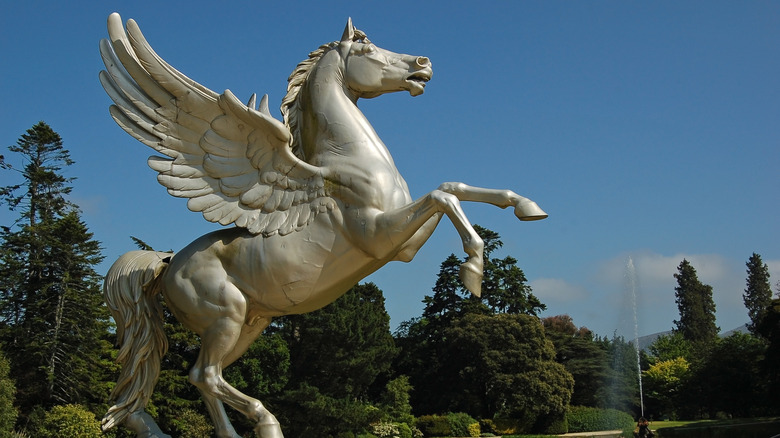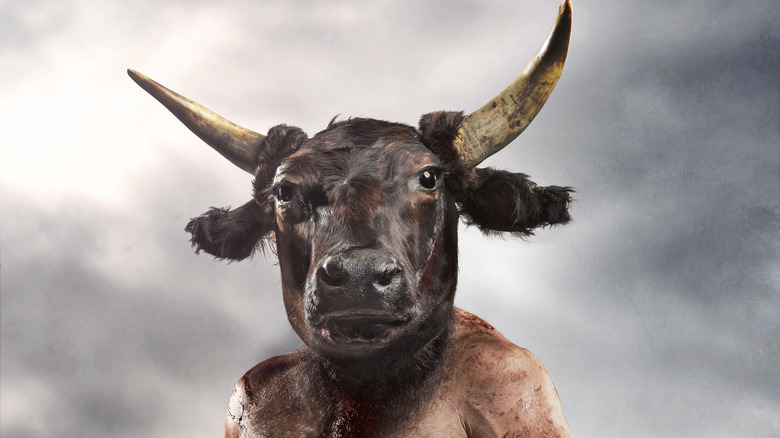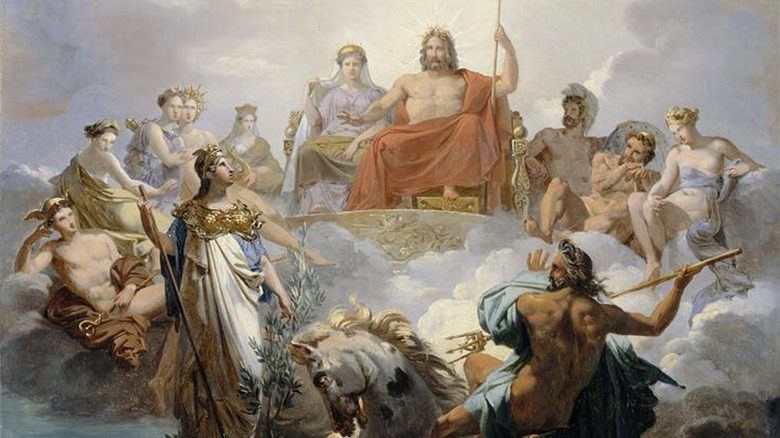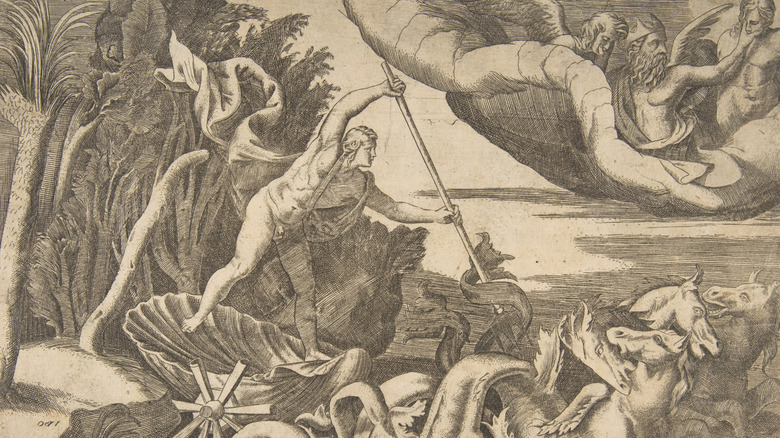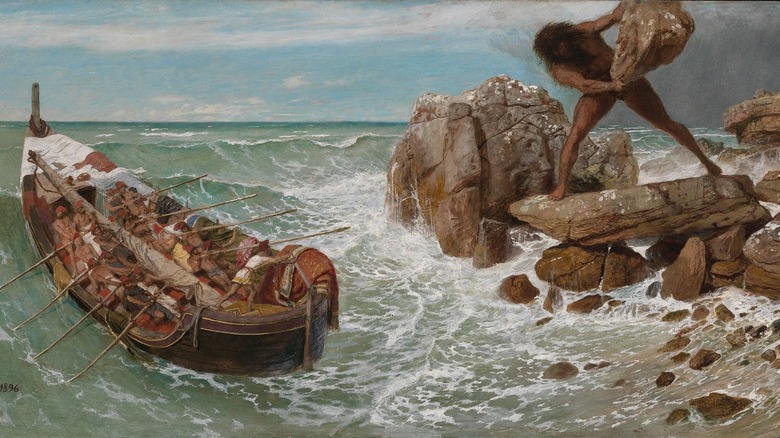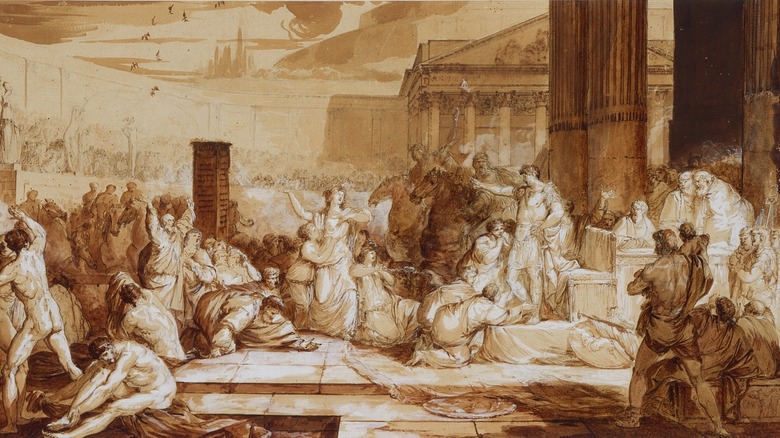The Mythology Of Poseidon Explained
Who doesn't know Poseidon? Referred to as Neptune in the Roman tradition, the trident-wielding, bearded lord of all things oceanic is one of the most prominent ancient Greek gods in popular culture today. This was also true in ancient Greek polytheism.
Poseidon is also one of the most misunderstood by modern people. He is often viewed as irate, powerful, or just an aquatic gamekeeper. Consider 1981's "Clash of the Titans," in which the god is the zookeeper of the mighty Kraken (which, by the way, is not from Greek mythology), cameos in Disney's "Hercules," or the fact that he's the father of the eponymous hero in the "Percy Jackson" series. At least in this last case, the character is treated with a bit more nuance. Heck, he is the only Greek god to make regular appearances in "SpongeBob!"
So what is the deal with Poseidon? The Theoi Project emphasizes that the mythology of Poseidon is a bit more complex than cartoonish characterizations. Not only was Poseidon a god of the sea, but the lord of earthquakes, the father of one-eyed monsters and winged horses, and the nemesis of the ancient hero Odysseus. Let's consider and explain the complex mythology surrounding Poseidon.
Poseidon was eaten by his father
Poseidon is one of the earliest deities worshipped by the ancient Greeks. According to the World History Encyclopedia, evidence of the Poseidon worship has been found in Crete and the Greek mainland from as early as the 15th century B.C. While we don't know much about the initial worship of Poseidon, later Greek mythology gives him a backstory central to ancient Greek polytheism.
Poseidon was the son of the Titan gods Kronos and Rhea. The early history of the gods in Greek mythology concerns how a younger generation of gods, called the Olympians, overthrew an earlier generation of gods called the Titans. As elaborated upon by the Theoi Project, Kronos had learned of a prophecy that his children would become more powerful than he. So he ate them. His feast included Hestia, Demeter, Hera, Hades, and Poseidon. Kronos' behavior should be no surprise to those who know this origin myth. Kronos castrated his father Ouranos to seize ultimate power. However, when Zeus was born to Rhea, she hid him and gave Kronos a swaddled rock to eat instead. Then, the next year (Greek gods grew up very fast), Zeus led a rebellion against his cannibalistic father. Zeus contrived to get his father to upchuck his siblings, who quickly joined him. Then together, they waged a ten-year war against the Titans resulting in the overthrow of Kronos and the establishment of a new Olympian order.
Poseidon only became god of the sea by dumb luck
Now that the Olympians were in charge, what did they do with their cannibalistic dad? The most common version of the story is that Kronos was banished to the hells of Tartarus with the other Titans, while another version, as explained by Britannica, is that he became a king of Elysium. Apparently, this new universal order wasn't appreciated by mortals, who had a better lot under Kronos.
In any event, the three most powerful of the Olympians, Zeus, Hades, and Poseidon, needed to figure out what to do with the universe. As described by the "Encyclopedia of Greco-Roman Mythology," the three brothers cast lots. Zeus got the sky, Hades became lord of the gloomy underworld, and Poseidon got the sea. The three gods had common ground on land, particularly at Olympus, although Poseidon's name, which means "spouse of the land," indicates that he had a special tie with land as well as sea. This is further backed by the title, Phytalmios, which means "fruitful," indicating how Poseidon was also a god of fertility. This could be tied to the notion that Poseidon also had dominion over fresh water, very necessary for successful agriculture.
Poseidon, as analyzed by the Theoi Project, is second in power only to Zeus, and the two would not always see eye-to-eye.
Poseidon's trident was made by Cyclopses
Poseidon's most famous accoutrement is his trident. In fact, any image of Poseidon is sure to feature one. The ancient writer Apollodorus presents the backstory of the trident, which is as interesting as the weapon itself.
After Zeus got Kronos to regurgitate his siblings and led the war against the Titans, the great Earth goddess Gaia prophesied that Zeus and his fellow Olympians would win if he allied with those whom the Titans had already hurled down into Tartarus. Some of these were the Cyclopses, who, as described by "Cyclops: the Myth and Its Cultural History," had been locked up repeatedly in Tartarus along with three monstrous beings called the Hecatoncheires, or Hundred-Handers, who sported 50 heads and 100 arms.
Zeus killed these immortal beings' jailor and allied with them. The Cyclopses then forged three divine weapons: Zeus' thunderbolt, Hades' invisibility helmet, and Poseidon's trident, which is an instrument of destruction, able to create earthquakes when he strikes it into the ground.
Poseidon was also the god of earthquakes and horses
It may come as a surprise to some, but the god of the sea was also the god of earthquakes and horses. The "Encyclopedia of Greco-Roman Mythology" explains that the earliest worship of the god was by invading Ionians and Minyans, who introduced fearsome chariots with them. These wheeled vehicles, pulled by thundering horses, explain much as to why Poseidon's title was Ennosigaios, meaning "Earth-shaker." In fact, as pointed out in "Poseidon, Walls, and Narrative Complexity in the Homeric Iliad," Poseidon shows his greatest power not over the seas but through his ability to jolt the land and shatter mountains.
In the early worship of Poseidon, he seems to have been the chief deity until an invasion of Achaeans around 1450 BCE introduced Zeus. Poseidon was demoted to chiefly a god associated with the sea. The World History Encyclopedia explains that typical representations of Poseidon show him living in golden mansions beneath the sea with his famed white horses. Another surname of Poseidon, according to the Theoi Project, is "Hippios," meaning "horse."
Poseidon's wife tried to run away but a dolphin smoothed things over
Poseidon wanted to marry the sea nymph, or Nereid, Amphitrite, but she had no intention of marrying him. According to the "Encyclopedia of Greco-Roman Mythology," Amphitrite hid herself in the distant corner of the world where the Titan Atlas held up the Earth. Therefore, Poseidon sent all the sea creatures who were his servants to find her, sort of like Aquaman, but on steroids. As described in "The Penguin Book of Classical Myths," a dolphin, Delphinus, was the first to find Amphitrite and managed to convince the nymph that Poseidon really wasn't that bad at all. The two were soon married. In recognition for Delphinus' service, he was immortalized in the constellations.
Amphitrite and Poseidon lived in their castle under the sea and with their son, the merman Triton — think the Little Mermaid's father. They couple may have also had a daughter, Rhodos. However, as shall be seen, Poseidon, like his brother Zeus, viewed monogamy as optional.
Poseidon had a lot of kids
Poseidon was a serial philanderer and spawned numerous important figures in Greek mythology. The Theoi Project dedicates a whole page to the suspected and actual children of the sea god. Some of the most notable included Theseus (pictured), the fabled slayer of the Minotaur that tormented the island of Crete, as well as Polyphemus, a cyclops who had a famous encounter with the hero Odysseus in "The Odyssey." Others, as noted in the World History Encyclopedia, included Orion the hunter and the whirlpool-spawning monster Charybdis. The conception of Theseus is a good illustration for how these divine trysts worked. As explained by "Classical Mythology," Aithra was the wife of King Aigeus of Athens. However, on a night that Aigeus lay with Aithra, the god also had sex with her, thus producing Theseus.
Poseidon also had same-gender interests, as shown in the case of Pelops. Pelops was the handsome son of Tantalus, and Poseidon was so taken by him that he carried him off to Olympus to be his lover. Eventually, Poseidon helped Pelops win his own wife.
Poseidon was the father of Pegasus
Poseidon even fathered the most famed of winged horses – Pegasus. The mythology of the Pegasus story is one of the most interesting in the Greek tradition. As detailed by the Metropolitan Museum of Art, Medusa was a beautiful maiden who was seduced by Poseidon in a temple dedicated to Athena. Well, Athena didn't care for that, so she turned Medusa's hair into snakes, and at a glance, Medusa could now turn anything to stone.
Other variations of the story place Medusa as one of three sisters called the Gorgons. However, unlike her sisters, she was mortal. Therefore, she became the object of a quest by the hero Perseus, who was sent to retrieve her head on what a king thought to be an impossible quest. However, Perseus, through the use of Hades' invisibility helmet and Athena's help, got close enough to use his highly polished shield to guide his blow to Medusa's neck. From the neck sprung the giant Chrysaor and Pegasus. As noted by Apollodorus, these two beings were the offspring of Poseidon — they just came out a different way.
Poseidon is also responsible for the Minotaur
One of the most well-known of the ancient Greek monsters was the Minotaur, a creature with the head of a bull and a man's body. While Poseidon did not beget the Minotaur, his actions caused its birth.
As explained by the World History Encyclopedia, King Minos of Crete, in order to cement his political power, sought to show that he had divine support for his rule. Therefore, he prayed to Poseidon to present him with a bull from the depths of the sea, promising that he would sacrifice it to the god. Poseidon obliged and sent a magnificent snow-white bull, called the Cretan Bull. Minos was happy since this proved that Poseidon himself supported his rule. However, the king could not bring himself to sacrifice the wonderful animal. Instead, he selected a lesser bull. Poseidon was naturally angry at the slight.
There are several versions of what happened next. In two common versions, Poseidon either cursed the king's wife, Pasiphae, to fall in love with the bull, or he asked Aphrodite, the goddess of love, to do it as a favor for him. This resulted in the mating of Pasiphae with the bull, and the result was the Minotaur, whom Pasiphae named Asterion, which eventually could only live on human flesh. There is some irony in this story since Theseus, the reputed son of Poseidon, ended up slaying the monster.
Poseidon squabbled with his fellow Olympians
The Olympian gods are famous for their squabbles with one another, and Poseidon is no exception. One famous dispute, detailed in "The Contest Between Athena and Poseidon in Myth, History, and Art," occurred between him and Athena for dominion of the land of Attica. Attica was the region of mainland Greece which encompasses the city of Athens, and both deities were keen to be the dominant god or goddess worshipped there. Poseidon expressed his act of possession by striking the earth with his trident, creating a sea or saltwater spring. Later versions of the myth have Poseidon presenting horses to humans. Athena claimed possession by planting history's first olive tree.
Before matters got out of hand, Zeus separated the two gods and appointed 12 arbiters to rule on the case. They chose Athena, believing that she had planted the olive tree first. As a result, the main city in Attica was named Athens. As for Poseidon, he stormed off and petulantly flooded Attica. This, however, is not to say that Poseidon was vilified in Athens. As pointed out by the World History Encyclopedia, the god was celebrated at the annual Posideia festival, and the month Poseidon was named after him. This was probably a smart move on the part of the Athenians; there was no need to make the second most powerful god any angrier at you than necessary.
Poseidon tried to usurp the throne of Zeus
Poseidon didn't just squabble. He also rebelled against Zeus, not caring to be Olympus' second fiddle. "Poseidon, Walls, and Narrative Complexity in the Homeric Iliad" recounts how Poseidon, along with Hera and Athena, plotted to overthrow Zeus soon after the overthrow of the Titans. They enlisted the assistance of Apollo, who, as described in the "Encyclopedia of Greco-Roman Mythology," put Zeus in chains. However, Thetis, the sea nymph and mother of Achilles, freed him with help of one of the Hundred-Handers.
Other versions of the myth, such as that discussed in "Ancient Greece and Rome: Myths and Beliefs" suggest that Zeus merely discovered the plot. Either way, Poseidon and Apollo were punished by being sent to build the fabled walls of the city of Troy. As recounted in the Roman poet Ovid's "Metamorphoses," both he and Apollo assumed mortal form and promised to build the walls for the king for a sum of gold. However, the king refused to pay them. As a result, Poseidon (equated with Neptune by Ovid) flooded the land and demanded that the king's daughter be handed over to a sea monster. However, Hercules rescued her. Still, the king refused his promise, so Hercules sacked Troy.
Poseidon was a major player in the Iliad and Odyssey
Poseidon, maybe because of his earlier experiences at Troy, was a strong supporter of Greeks during the Trojan War. As a result, he makes prominent appearances in Homer's "Iliad" and directly involves himself in the war. For example, in Book 13, after the Trojans, led by Hector, have breached the Greek (or Achaean) encampment, things look grim. At this, Poseidon disguised himself and imbued fighting spirit back into the Greeks, even leading a charge that drove the Trojans off.
In "The Odyssey," Poseidon takes on an even more prominent role as one of the main antagonists of Odysseus while on his journey home to Ithaca. After Odysseus pulls off a harrowing escape from the giant cyclops Polyphemus, the monster prays to his father, Poseidon, to avenge him. While Poseidon cannot kill Odysseus, since it is decreed by the fates that he'll make it back, he made the journey a torment for him. The god contrived to indirectly kill Odysseus' comrades and ensure that the journey became a multi-year quest. When Odysseus finally returned to Ithaca, he was 20 years older than when he set off to the Trojan War.
Poseidon's biggest celebration was the Isthmian Games
While the Olympic Games are generally well-known as a part of ancient Greek culture, Poseidon was particularly venerated at the biannual Isthmian games. "Isthmian" refers to the Isthmus of Corinth, where they were played at Poseidon's sanctuary. Corinth was an excellent choice for Panhellenic games since, as the book "The Smell of Sweat" reports, Corinth was on a main road leading to Athens, was central in Greece, and was easily accessible by sea. The games became a major tourist attraction and undoubtedly a huge moneymaker for Corinth.
Open to all Greeks but particularly popular with Athenians, these games, as Britannica notes, were held biannually, played in the spring of the second and fourth years of each Olympiad. Some of the games' main features included musical competitions, athletic contests, and, naturally enough for the horse god, horse races. The University of Pennsylvania explains that the winners of the games received a monetary reward as well a crown of wild, dry celery. During Roman times, this was changed to a pine wreath since the pine was considered sacred to Poseidon.
These games continued until the fourth century A.D. when the rise of Christianity frowned on such pagan festivals. It was at about that time, with the rise of monotheism, that the worship of Poseidon finally died, and he transformed into the caricature we know and love today.
